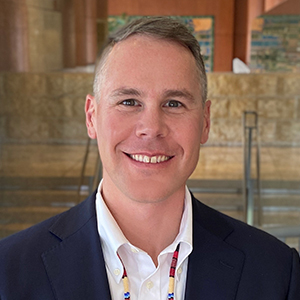On Feb. 1, I had the privilege and honor to become the director of the Center for Indian Country Development (CICD) at the Minneapolis Fed. In many ways, this is a dream job.
The focus of the Center aligns with my contributions to education, youth development, and economic development in Indian Country over the past 20 years. Our emphasis on robust academic and applied research, or as we call it “actionable research,” brings much needed data and policy insights into the data deserts of Indian Country. Our partnerships in Indian Country tap into the collective motivation to accelerate economic and community development for tribal nations and indigenous peoples. The Bank’s commitment to Indian Country is palpable, and the energy to seek change and elevate best practices in education, homeownership, and access to capital is invigorating.
I quickly had the opportunity to dive into the deep end of the proverbial CICD pool, gaining a comprehensive understanding of our past efforts, current initiatives, and visions for the future. I have been fortunate to partner with past CICD directors Sue Woodrow and Patrice Kunesh. I look forward to building on the strong foundation they laid. Additionally, CICD team members Donna Feir and James Colombe bring a level of passion for research, policy, and action to tribal economic development that is impressive. I look forward to working with the CICD team, contributors in the Federal Reserve System, and partners across the country to pursue an economy that works for all of us, including Indian Country.
The past year has been busy and exciting for the CIDC. We are proud of the wide range of research we produced, the public outreach we engaged in, and the follow-up conversations that spurred collective action and policy considerations to advance our tribal communities. We are eager to amplify our efforts in 2020.
In 2019, the CICD continued to support homeownership in Indian Country and reveal the exorbitant price of capital in Indian Country. A working paper by Donna Feir, which garnered much attention, shows that Native Americans, especially those living on reservations and those using manufactured housing, pay higher interest rates on home loans than other populations. The CICD appreciates our partners and others working on lending and capital access in Indian Country, including Native community development financial institutions, the U.S. Department of Agriculture, Fannie Mae, and NeighborWorks America. Affordable housing and credit continue to be focal points for the Center’s research in 2020.
Alongside our partners, we have been expanding the utility of the Tribal Leaders Handbook on Homeownership. In January, the CICD and the National Congress of American Indians co-hosted an Indian Country homeownership webinar series based on the Handbook; the series will be available online in the coming weeks.

Additionally, Enterprise Community Partners has been conducting trainings with the Handbook and recently launched an online curriculum, Enhancing and Implementing Homeownership in Native Communities. Enterprise and the United Native American Housing Association conducted three-day trainings for tribal practitioners in Denver and Phoenix covering critically important material, such as needs assessments, home buyer readiness, lending systems, land use, and supporting homeownership with tribal governance. Enterprise recently launched the inaugural Native Homeownership Learning Communities Cohort to train tribal organizations on homeownership with the goal of building capacity and increasing homeownership in Indian Country.
Last October, my predecessor Patrice Kunesh testified before the Senate Committee on Indian Affairs on housing and lending in Indian Country. The CICD submitted written testimony on the topic with research findings from the Center and the Federal Reserve. The hearing featured excellent testimony from Isleta Pueblo Governor Max Zuni and Fort Belknap Indian Community Councilman Nate Mount. The hearing elevated conversations regarding lending terms faced by Native Americans and tribes as well as challenges the Bureau of Indian Affairs (BIA) faces in providing timely Title Status Reports and HEARTH Act regulation approvals.
Sen. John Hoeven (R-North Dakota) highlighted some of the core issues in his opening remarks: “The dream of homeownership is a foundational principle in any society. … However, rural and tribal communities often have a difficult time accessing credit and the ability to secure a mortgage on trust lands.”
Sen. Tina Smith (D-Minnesota) acknowledged “the great work that is being done at the Center for Indian Country Development at the Minneapolis Fed,” adding, “We’re so lucky to have you as a resource in Minnesota.”
The CICD will stay up to date with the U.S. Department of Housing and Urban Development, the BIA, and the Senate committee in 2020 as we all work to understand and improve lending and housing in Indian Country.
Meanwhile, we said some good-byes and hellos to our staff. Last spring, long-time contributor to research and collaboration in Indian Country, research economist Dick Todd, retired. Project manager Nikki Pieratos found new opportunities with the NDN Collective, and Jessie Welton moved on to a role with the Minneapolis Public Schools. We were joined by research assistants Obinna Iwuji, Dillon Corrigan, and Charles Golding, summer intern Alexander Modeas, and research fellows Matthew Harvey and Kenneth Whaley. Whaley’s article on the low-income housing tax credit program in Indian Country was recently published and supported the CICD’s testimony to the Senate Committee on Indian Affairs. Additionally, Jim Colombe joined the CICD in July as a project manager, leading our efforts on homeownership.

As always, we depend on you, our partners. Without the indigenous and non-indigenous leaders, researchers, and policymakers that we work with, we could not do this work. Here’s to strengthening those partnerships and bringing positive change to Indian Country in 2020.
Lem’lmnts,

Casey Lozar (Salish Kootenai)
Vice President, Director of the Center for Indian Country Development
Casey Lozar is a Minneapolis Fed vice president and director of our Center for Indian Country Development, a research and policy institute that works to advance the economic self-determination and prosperity of Native nations and Indigenous communities. Casey is an enrolled member of the Confederated Salish and Kootenai Tribes and he’s based at our Helena, Mont., Branch.



